Related Research Articles

Maurice Ernest Gibb was a British musician, singer, songwriter and record producer who achieved fame as a member of the Bee Gees. Although his elder brother Barry Gibb and fraternal twin brother Robin Gibb were the group's main lead singers, most of their albums included at least one or two songs featuring Maurice's lead vocals, including "Lay It on Me", "Country Woman" and "On Time". The Bee Gees were one of the most successful rock-pop groups of all time.
"I Still Love You" is a song by the Bee Gees primarily written by Barry, Robin & Maurice Gibb. It was released as a double A side of "Living Eyes" and on the album Living Eyes. Produced by the Gibb brothers with Albhy Galuten and Karl Richardson.

Still Waters is the twenty-first and penultimate studio album by the pop group the Bee Gees, released on 10 March 1997 in the UK by Polydor Records, and on 6 May the same year in the US by A&M Records.
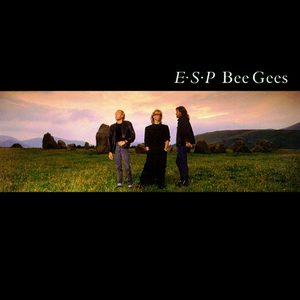
E.S.P. is the seventeenth studio album by the British group the Bee Gees. Released in 1987, it was the band's first studio album in six years, and their first release under their new contract with Warner Bros. It marked the first time in twelve years the band had worked with producer Arif Mardin, and was their first album to be recorded digitally. The album sold well in Europe, reaching No. 5 in the UK, No. 2 in Norway and Austria, and No. 1 in Germany and Switzerland, though it failed to chart higher than No. 96 in the US.
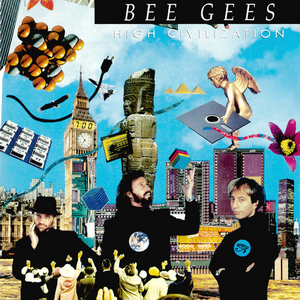
High Civilization is the nineteenth studio album by British pop group the Bee Gees, released on 25 March 1991 in the U.K., and 14 May 1991 in the U.S. It was their last album recorded for Warner Bros. Records, after a four-year contract. Possibly in reaction to firm resistance from U.S. radio to the previous two albums, E.S.P. (1987) and One (1989), which had done well in other countries, the U.S.-based Warner Bros gave this one less promotion and did not issue remixes. They recorded this album and their next album Size Isn't Everything with engineer Femi Jiya.

"You Win Again" is a 1987 song written by Barry, Robin and Maurice Gibb and performed by the Bee Gees. Released as a single in late 1987, it marked the start of the group's comeback, becoming a No. 1 hit in many European countries, including topping the UK Singles Chart—their first to do so in over eight years—and making them the first group to score a UK No. 1 hit in each of three decades: the 1960s, 1970s, and 1980s.
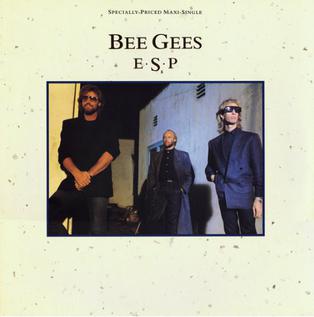
"E.S.P." was a single by the Bee Gees. Released in 1987, it was the follow-up to their successful single "You Win Again". The a cappella intro found on the album version was edited out for radio airplay.

"Ordinary Lives" is a single released by the Bee Gees in 1989. It was taken from their 16th studio album One. Following the premature death of their younger brother Andy Gibb in 1988, the Bee Gees dedicated this song and their new album to him. Originally the song was titled "Cruel World" but was later changed to "Ordinary Lives".
"Melody Fair" is a song by the Bee Gees, written by Barry, Robin & Maurice Gibb in 1968 and released in 1969 on their album Odessa. It was not released as a single, but this song was played on many radio stations, and was a hit in Japan. Andy Gibb's 1974 group, named Melody Fayre was named after this song. It also featured as the theme to Melody, a British film featuring a number of Bee Gees songs in its soundtrack.

"Peace of Mind" is a song by the Bee Gees, released in Australia as their third in March 1964 and backed with "Don't Say Goodbye".
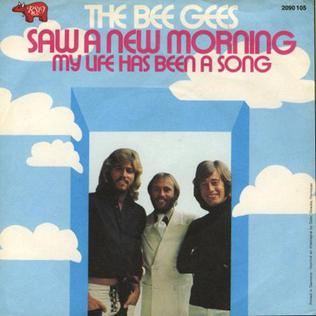
"Saw a New Morning" is the 1973 single released by the Bee Gees. It was also the group's first single released on Robert Stigwood's newly created records label RSO Records. The Bee Gees moved to Los Angeles in 1972 to record the album Life in a Tin Can which was a new direction for the group, who had been recording in England since 1967. The B-side, "My Life Has Been a Song" features lead vocal by Robin Gibb as well as Barry Gibb.

"Angela" is a song performed by the Bee Gees from the album E.S.P., released as a single in 1987. It was written by Barry, Robin and Maurice Gibb. The demo version appears on The E.S.P. Demos, and there is a promo video for this song. In West Germany, the song reached a chart position of No. 52.
"Irresistible Force" is a song by the Bee Gees, released in March 1997 on their album Still Waters, this song was written by Barry Gibb, Robin Gibb and Maurice Gibb.
"Black Diamond" is a song by the Bee Gees released on the album Odessa in 1969. The song was written by Barry, Robin & Maurice Gibb and featured lead vocals by Robin Gibb. It was included on the compilation Marley Purt Drive released in 1970.
"My Lover's Prayer" is a song performed by the Bee Gees, written by Barry Gibb, Robin Gibb and Maurice Gibb, and was released in 1997 on the album Still Waters. The track was originally written and recorded in 1995, but it was only a demo.
"Sinking Ships" is a song by the Bee Gees, released as the B-side of "Words" in January 1968. It was written by Barry, Robin & Maurice Gibb and produced by Robert Stigwood and the Bee Gees. The song was unusual for the group in that it featured solo vocal lines from all three Gibb brothers. It was reissued in Germany in 1987. Both tracks were released as a double A in Germany, Netherlands, Japan and France.
Sunrise is the tenth and final album by American soul singer Jimmy Ruffin, it was released in May 1980 and was produced by Robin Gibb and Blue Weaver. The songs were co-written by Gibb either with Weaver and/or his brothers. This album was released in US, Netherlands, UK, Norway and Germany. The lead single "Hold On " reached top ten in UK and US.
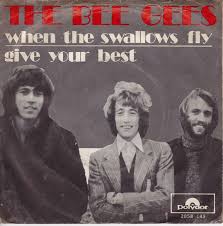
"When the Swallows Fly" is a song by the Bee Gees released on their fifth album Idea. Its promotional video was filmed in Brussels and included on the TV special Idea and was aired on 11 December 1968.
"Close Another Door" is a song written by Barry, Robin and Maurice Gibb and recorded by the Bee Gees, initially on their 1967 album Bee Gees' 1st and later as the B-side of "To Love Somebody".

"Crazy for Your Love" is a song by pop music group Bee Gees, which was released in 1988 as the third single from their seventeenth studio album E.S.P. (1987). The song was written by Barry Gibb, Robin Gibb and Maurice Gibb, and produced by Arif Mardin and the Bee Gees, with co-production by Brian Tench. "Crazy for Your Love" peaked at No. 79 in the UK Singles Chart and remained in the Top 100 for two weeks.
References
- ↑ Discogs.com. "Bee Gees: E.S.P."
- ↑ Joseph Brennan. "Gibb Songs: 1987".